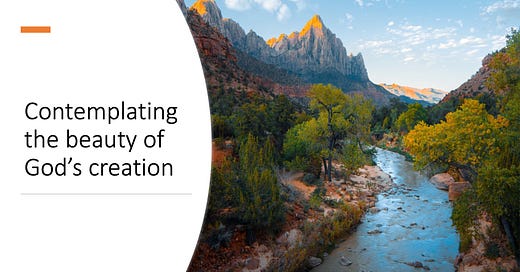Contemplating the beauty of God’s creation
Psalm 104:1-2a, 5-6, 10 and 12, 24 and 35c. February 6, 2023.
Monday, 5th Week in Ordinary Time
Psalm 104 accompanies our first reading from the book of Genesis describing the creation of the world. The psalm is known as a hymn in praise of the Creator of a perfect world in which evil has no place. The psalmist is fascinated by the beauty and order in creation. This psalm is an ancient answer to the questions asked by our contemporary thinkers: “why is there something rather than nothing?” and “why is the universe intelligible?”
The psalm begins and ends with praising the Lord (Ps 104:1, 35). In between, the author presents the universe as the revelation of God’s majesty and His glory. I have a similar feeling whenever I contemplate the stars on a cloudless night, the sunrise and sunset, walking through the forest and listening to the chirping birds or standing on a beach and seeing vastness of the ocean. In such moments, I join the psalmist in the praise of the Lord who created all of this beauty. “O Lord, my God, you are great indeed!” “In wisdom, you have created [all those manifold works of Yours]” (see Ps 104:1, 24).
The psalm could be an inspiration for St. Francis to compose his famous song in praise of the Creator God known as “Canticle of the Creatures”. That Canticle has been recently popularised by the encyclical letter of Pope Francis that took its title from the repeated line of that song, “Laudato Si - be praised, my Lord”. The encyclical letter addresses our contemporary ecological crisis and tries to show us the ways out of it. In view of the psalmist, any ecological movement has to begin with twofold realisation. The first is the belief that the entire creation is the work of the Creator derived from and dependent on the Lord. And the second is the awareness that at the root of the ecological crisis is human sinfulness.
Before ending his beautiful song in the praise of the Lord, the psalmist inserts a surprising prayer: “Let sinners be consumed from the earth, and let the wicked be no more!” A similar line can be found in the canticle of St. Francis: “Woe to those who die in mortal sin!” This line of the psalm is interpreted as a warning against the exploitative use of creation. Unfortunately, this warning is being ignored in our contemporary world which values profit above anything else. We live as if God did not exist and everything is permissible. The antidote to our arrogant attitude is the realisation of our dependence on God. We are one of his many creatures and we should obey his commands.
The psalmist’s beautiful description of a perfect world in which evil has no place points to the new creation described in the book of Revelation as “a new heaven and a new earth” freed from death, mourning, crying, and pain (see Rev 21:1, 5).
Contemplating the beauty of this world and looking forward to the unimaginable beauty of the world to come, we sing with the psalmist: “Bless the LORD, O my soul! Alleluia” (Ps 104:35).




